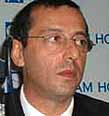UK Israeli Ambassador: Japan Can Contribute to Middle East Peace
His Excellency Dr Zvi Heifetz (Ambassador of Israel to the United Kingdom) and J. Sean Curtin (Fellow, GLOCOM and Asia Times)
Sean Curtin: A reelected President Bush has indicated that his second administration is very positive about getting actively involved in the peace process, the Palestinian leader Yassar Arafat has passed away and we have the unilateral Israeli Gaza disengagement plan of Prime Minister Ariel Sharon. These are three positive signs which should help push the peace process forward. Japan has signaled that it would like to help move the Israel-Palestine peace process along in anyway it can. This year, it has pledged to donate $10 million to the newly created World Bank trust fund to support the Palestinian Authority and $10 million for the Greater Middle East Initiative education projects. This year, the Japanese Foreign Ministry has also hosted a three-day Israel-Palestine confidence-building conference in Tokyo, which allowed leading figures from both sides an opportunity for face-to-face discussions. Japanese Prime Minister Junichiro Koizumi has indicated that he is willing to assist both sides in any way possible. What contribution do you think Japan can make or do you think there are already too many parties wanting to make a contribution to the Middle East peace process?
 Zvi Heifetz: First of all, I agree with your analysis that the re-election of President Bush, the departure of Mr. Arafat and the disengagement plan create a positive atmosphere. I am very optimistic, but also realistic, so I must warn that nothing will happen over night. In the Middle East nothing happens too fast, we will need patience, but the atmosphere is much more positive and the horizon looks good. Zvi Heifetz: First of all, I agree with your analysis that the re-election of President Bush, the departure of Mr. Arafat and the disengagement plan create a positive atmosphere. I am very optimistic, but also realistic, so I must warn that nothing will happen over night. In the Middle East nothing happens too fast, we will need patience, but the atmosphere is much more positive and the horizon looks good.
With regard to Japan, of course, I would welcome any support that it can give to the Palestinian Authority to help their economic recovery. I think that if their economy recovers and order is established, then it this will create a better atmosphere for negotiations.
I think the Japanese contribution is completely sincere, they really want to help. They are proposing financial assistance and pledging their support. In contrast, it is very strange that the Arab countries are not more engaged in the process. I believe they could be both instrumental and helpful in assisting the Palestinian Authority in the process of economic recovery.
I would like to make one further point about Japan. I find it very strange that Japan is proposing all this help and the Arab countries like Saudi Arabia, Kuwait and the United Arab Emirates are just sitting there on the sidelines. You know, it is reminiscent of the old style of puppet show in which the main action is on stage and you have these little side characters just shouting away bad things.
Profile: Zvi Heifetz
Last December, Dr Zvi Heifetz was appointed the Ambassador of Israel to the Court of St James, the official title of the UK ambassador, and took up his post in July 2004. He is a former businessman, and at 47 years he is one of the youngest envoys in the UK, bringing a certain sense of dynamism to the post. He was born in the Siberian city of Tomsk, in the then Soviet Union, where his parents were living in exile. He came to live in Israel at the age of 14. After leaving the Israeli army, he qualified as a lawyer and then went into the business world. He headed one of Israel's main media groups, a leading music company as well as one of Israel's top basketball clubs. In order to take up his diplomatic post, he gave up his business interests. He is reported to be a close friend of Omri Sharon, the son of Israeli Prime Minister Ariel Sharon.
The above interview took place at Chatham House in London on 1 December 2004
(Some portions of this interview have also appeared in the Asia Times Online Ltd, http://www.atimes.com, and those sections are reproduce with permission and copy-righted to Asia Times Online.)
Related Articles
Japan's Role in the Middle East Peace Process
Europe Report #107, 27 October 2004
| 




